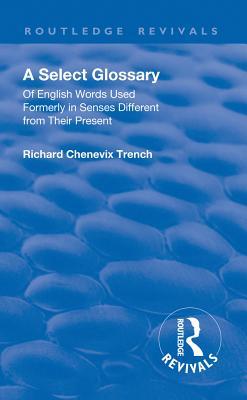- Bible
- Read the Bible
- Bible Versions
- Verse of the Day
- Reading Plans
- Verses by Topic
- Books of the Bible
- Bible Images
- Study
- Commentaries
- Concordances
- Dictionaries
- Encyclopedias
- Sermons
- Bible Atlas & Maps
- BP Wiki
- Devotionals
- Today's Devotionals
- Light of the World
- All Devotionals
- Inspirational Quotes
- More
- Picture Quotes
- Videos
- Inspirational
- Bible Study
- What The Bible Says
- Bible Q&As
- Daily Bread
- Bible by Genre
- Bible Stories
- Random Bible Verse
- Community
- Store
Revival: A Select Glossary (1906): Of English Words Used Formerly in Senses Different from Their Present
by Richard Chenevix Trench
This volume is intended to be a contribution to a special branch of the study of our own language. It proposes to trace in a popular manner and for general readers the changes of meaning which so many of its words have undergone; words which, as current with us as they were with out forefathers, yet meant something different on their lips from what they mean on ours.
BUY NOW
ebook, 248 pages
Published May 8th 2018 by Routledge
© 2025 Bibleportal.com All rights reserved.

1807-1886
Richard Chenevix Trench was an Anglican archbishop and poet. In 1851 he established his fame as a philologist by The Study of Words, originally delivered as lectures to the pupils of the Diocesan Training School, Winchester.
In 1856 Trench became Dean of Westminster, a position which suited him. Here he introduced evening nave services. In January 1864 he was advanced to the post of Archbishop of Dublin. Arthur Penrhyn Stanley had been first choice, but was rejected by the Irish Church, and, according to Bishop Wilberforce's correspondence, Trench's appointment was favoured neither by the prime minister nor the lord-lieutenant. It was, moreover, unpopular in Ireland, and a blow to English literature; yet it turned out to be fortunate. Trench could not prevent the disestablishment of the Irish Church, though he resisted with dignity. But, when the disestablished communion had to be reconstituted under the greatest difficulties, it was important that the occupant of his position should be a man of a liberal and genial spirit.
... Show more